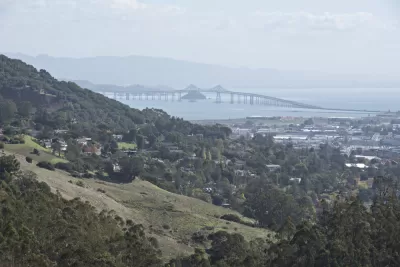Marin County, the wealthy county in the North Bay Area with a history of exclusionary land use and transportation practices, is using the shortage of water to justify blocking the development of an affordable housing project.

"Housing advocates and developers are warily watching California’s intensifying drought and what it may mean in a state that needs millions of new homes to house its residents," reports Emily C. Dooley.
According to Dooley, "the state’s twin issues of housing stock and water availability are colliding." New housing requires more water and puts stress on existing water supplies, which is especially true for the sprawling housing developments that have for decades been the most common form of new housing in the state. At a time when the state is empowering water regulators to divert water supplies, the state needs 120,000 new affordable homes every tear until 2030, according to an estimate by the California Housing Partnership.
Much of the article focuses on the potential consequences of the drought for affordable housing development in Marin County. According to Dooley, the Marin Municipal Water District is considering a moratorium on new water connections after stalling an affordable housing project in the name of water. The decision to stall the water permits for a 74-unit multifamily development approved by the county for low- and extremely low-income residents is also likely to set a precedent for a "healthy aging center" working its way through the permitting process.
Another city, Oakley, in Summit County, Utah, has also taken steps to block development out of concerns about the local water supply, but the Marin County example certainly sets the decision in a different development context. The article invokes the word NIMBY to describe the effect of the drought on housing politics in the state of California. "Housing is needed throughout the state. Where housing opponents usually cite traffic concerns, water concerns could become one more way to thwart development," according to Dooley.
The action by the Marin Municipal Water District to block the construction of affordable housing comes at the same time as governments around the state of California plan to meet the targets for planned housing development according to the mandates of the Regional Housing Needs Assessment process.
FULL STORY: Water and Housing Needs Collide in California’s Severe Drought

Planetizen Federal Action Tracker
A weekly monitor of how Trump’s orders and actions are impacting planners and planning in America.

Maui's Vacation Rental Debate Turns Ugly
Verbal attacks, misinformation campaigns and fistfights plague a high-stakes debate to convert thousands of vacation rentals into long-term housing.

San Francisco Suspends Traffic Calming Amidst Record Deaths
Citing “a challenging fiscal landscape,” the city will cease the program on the heels of 42 traffic deaths, including 24 pedestrians.

Defunct Pittsburgh Power Plant to Become Residential Tower
A decommissioned steam heat plant will be redeveloped into almost 100 affordable housing units.

Trump Prompts Restructuring of Transportation Research Board in “Unprecedented Overreach”
The TRB has eliminated more than half of its committees including those focused on climate, equity, and cities.

Amtrak Rolls Out New Orleans to Alabama “Mardi Gras” Train
The new service will operate morning and evening departures between Mobile and New Orleans.
Urban Design for Planners 1: Software Tools
This six-course series explores essential urban design concepts using open source software and equips planners with the tools they need to participate fully in the urban design process.
Planning for Universal Design
Learn the tools for implementing Universal Design in planning regulations.
Heyer Gruel & Associates PA
JM Goldson LLC
Custer County Colorado
City of Camden Redevelopment Agency
City of Astoria
Transportation Research & Education Center (TREC) at Portland State University
Jefferson Parish Government
Camden Redevelopment Agency
City of Claremont





























